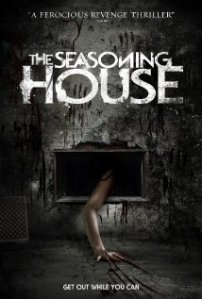 The Seasoning House is a stark tale of repression and the point at which revenge becomes a necessity, not a desire. Girls are abducted to a literal den of iniquity and forced into a life of sexual slavery at the hands of Viktor (Kevin Howarth) as a commodity for his abhorrent clients. The protagonist is a young deaf girl, Angel (Rosie Day), who is spared the sexual abuse of the other girls, but is required to prepare them for clients and has to avoid the ever-present threat of violence that accompanies her captivity.
The Seasoning House is a stark tale of repression and the point at which revenge becomes a necessity, not a desire. Girls are abducted to a literal den of iniquity and forced into a life of sexual slavery at the hands of Viktor (Kevin Howarth) as a commodity for his abhorrent clients. The protagonist is a young deaf girl, Angel (Rosie Day), who is spared the sexual abuse of the other girls, but is required to prepare them for clients and has to avoid the ever-present threat of violence that accompanies her captivity.
Set in the war-torn Balkans in 1996 (perhaps ’96 to deliberately place it outside any of the Yugoslav Wars in Croatia, Bosnia and Kosovo of that decade?) The Seasoning House uses its set and setting to perfectly encapsulate the horrors that are to come. The cheapness of life and absence of basic humanity are thematically represented in both the macro and microcosm of this film.
Within the first six minutes the Director (Paul Hyett) lays bare the full tragedy of the premise. New girls are delivered to Viktor and he immediately slaughters one to ensure the obedience of the others. This warns of a difficult cinematic experience ahead, but it is performed with such accomplishment there is confidence that all will be handled competently.
The appalling reality of the house is further revealed as the girls are bound and Angel is forced to administer Heroin to them – their compliance now assured in a tether of violence and narcotic submission. Hyett employs an appreciated lack of sensationalism to the process, which keeps the film grounded and focussed on the absorbing tale that is beginning to unfold.
Indeed, this atmosphere of vile oppression is unrelenting and the film is harrowing throughout. The death of Angel’s mother at the hands of laughing, complacent soldiers is depicted with heart-breaking clarity in flashback. Angel’s life from prior to her abduction is shown this way to enhance her character development, beyond what would be possible with a deaf mute in a single location. Whilst being unobtrusive to avoid slowing the pace of the film, the flashbacks still provide a stark contrast between Angel’s previous life and current situation.
Hyett uses most of the first act to build the immersion into the emerging story. There is no doubt as to the hellish existence of the girls, the utter revulsion at the men who pay to use them or the callous barbarism of their captors. Thus, as the first major plot point arrives, suspension of disbelief has been expertly crafted.
It is soon revealed that Angel uses vents in the building to secretly move around the house. This adds an interesting extra dimension not just to her character (an inevitable harsh penalty for discovery still can’t fully contain her) but also to the set, as over an hour of the ninety-minute running-time takes place in this building, which is now made an extension of Angel’s private world. The irony that the structure which imprisons her becomes her greatest advantage is an obvious but enjoyable one. Naturally this was reminiscent of The People Under The Stairs, although The Seasoning House is a far more tangible and oppressive movie.
Right on schedule at the half-way point of the film, the soldiers who killed Angel’s mother turn up at the house. Angel hears the screams of the only girl she has befriended in the house, as one of the military men rapes her to death. To this point the film’s pervasive sense of helplessness made it easy to forget that this is a story of revenge; so Angel’s first act of retribution came as a genuine shock, not least because it was so utterly brutal in its ferocity and violence.
A fantastically anxious final act then follows with the soldiers and Viktor hunting Angel down through the house and beyond. Hyett hit the balance between ultra-violence and adrenaline-inducing thrills very well. The earlier craftsmanship to create such empathy towards Angel reaped its rewards as it transformed into a vicarious tension as she is pursued.
Sean Pertwee, as Goran – the captain of the militia, was typically excellent. This is the kind of role he excels at (such as in Dog Soldiers). The south-eastern European accent must have been a challenge to maintain, and this occasionally shows, but not too much to be intrusive. Indeed, the acting across the cast is very good, with Rosie Day another stand-out, as Angel, hitting the perfect note in every scene, and avoiding the easy clichés of playing victim or heroine.
It is true to say that every aspect of this film has been done before; but originality is a harsh yardstick to hold any movie to, especially horror. The Seasoning House proves that if a tale is well told and the production values are high, lack of innovation in the story and set pieces are not sufficient to prevent the film being an effective one.
Quality scriptwriting ensured that it was gratifyingly uncertain as to how the ending of The Seasoning House would arrive. Would there be salvation, retribution or the brutal realism of an unhappy ending? The Seasoning House makes its choices, leaves an intelligent degree of ambiguity and executes its conclusion in the same satisfying manner afforded to the rest of the piece.